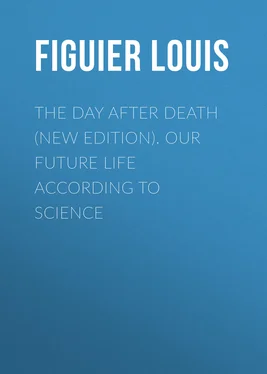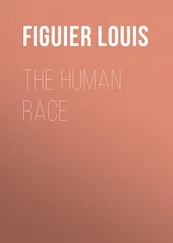Louis Figuier - The Day After Death (New Edition). Our Future Life According to Science
Здесь есть возможность читать онлайн «Louis Figuier - The Day After Death (New Edition). Our Future Life According to Science» — ознакомительный отрывок электронной книги совершенно бесплатно, а после прочтения отрывка купить полную версию. В некоторых случаях можно слушать аудио, скачать через торрент в формате fb2 и присутствует краткое содержание. Жанр: Эзотерика, foreign_religion, foreign_antique, foreign_prose, на английском языке. Описание произведения, (предисловие) а так же отзывы посетителей доступны на портале библиотеки ЛибКат.
- Название:The Day After Death (New Edition). Our Future Life According to Science
- Автор:
- Жанр:
- Год:неизвестен
- ISBN:нет данных
- Рейтинг книги:5 / 5. Голосов: 1
-
Избранное:Добавить в избранное
- Отзывы:
-
Ваша оценка:
- 100
- 1
- 2
- 3
- 4
- 5
The Day After Death (New Edition). Our Future Life According to Science: краткое содержание, описание и аннотация
Предлагаем к чтению аннотацию, описание, краткое содержание или предисловие (зависит от того, что написал сам автор книги «The Day After Death (New Edition). Our Future Life According to Science»). Если вы не нашли необходимую информацию о книге — напишите в комментариях, мы постараемся отыскать её.
The Day After Death (New Edition). Our Future Life According to Science — читать онлайн ознакомительный отрывок
Ниже представлен текст книги, разбитый по страницам. Система сохранения места последней прочитанной страницы, позволяет с удобством читать онлайн бесплатно книгу «The Day After Death (New Edition). Our Future Life According to Science», без необходимости каждый раз заново искать на чём Вы остановились. Поставьте закладку, и сможете в любой момент перейти на страницу, на которой закончили чтение.
Интервал:
Закладка:
If we admit, that the only function which the superhuman being has to exercise is that of respiration, the extreme simplicity of his body will be easily understood. The numerous and complicated organs and apparatus which exist in the bodies of men and animals, have for their object the exercise of the functions of nutrition and reproduction. These functions being suppressed in the creature whom we are considering, his body must be proportionably lightened. Everything is reduced to respiration, and the preservation and maintenance of the faculties of the soul; all is in harmony with those ends. We admire, with good reason, the wise mechanism of the bodies of men and animals; but, if human anatomy reveals prodigies in our structure, marvellous provision in securing the preservation of the individual and his reproduction, what infinitely greater marvels would, if we were but permitted to study it, be revealed by the organization of the body of the superhuman being, in which everything is calculated to secure the maintenance and the perfection of the soul. With what astonishment should we learn the use and the purpose of the different parts of that glorious body, discover the relations of resemblance or of origin between the living economy of the human, and the living economy of the superhuman being, and divine the relations which might exist between the organs of the superhuman being and those which he should assume in another life, still superior, in which he should be the same being, again resuscitated in new glory and fuller perfection!
The special organization of the being whom we are describing would give him the power of transporting himself in a very short space of time from one place to another, and of traversing great distances with extraordinary rapidity. We are but simple human beings, and yet by thought we devour space, and travel, in a twinkling, from one end of the globe to another; may we not therefore believe that the bodies of superhuman beings, in whom the spiritual principle is dominant, are endowed with the privilege of passing from one point in space to another, with a rapidity which the speed of electricity enables us to measure?
The superhuman being, who does not require to eat or drink, or rest, who is always active, and incessantly sensible, has no need of sleep. Sleep is no more necessary for the reparation of his forces, than food for their creation. We know that man is deprived of one third of his existence, by the imperious necessity for sleep. A man who dies at thirty years of age, has in reality lived for twenty only; he has slept all the rest of the time! What a poor notion this conveys of the condition of man! Whence arises this need of sleep? It arises from the fact that our forces, impaired by their exercise, require inaction and motionlessness for their repair—this is attained in the kind of temporary death produced by the suspension of the greater portion of the vital action, in sleep. During sleep, man prepares and stores up the forces which he will require to expend during the ensuing period. He devotes the night to this physical reparation, as much in obedience to what he observes in all the other portions of creation, as in obedience to the customs of civilization. But it is probable that all the forces of the superhuman being are inexhaustible, and that they do not require sleep, which is one of the hardest conditions of human existence. Everything leads us to believe that perpetual wakefulness is the permanent state of the superhuman being, and that the word "sleep" would have no meaning for him.
Darkness must be equally unknown to all those beings who float in the ethereal spaces. Our night and day are produced alternatively by the rotation of the earth upon her axis, a rotation which hides the sun from her view during one half of her revolution. This rotatory motion draws our atmosphere with it, but its influence extends no further, the ether which surmounts our atmosphere is not subject to it. That fluid mass remains motionless, while the earth and its atmosphere turn upon their axis. The superhuman beings, who, according to our ideas, inhabit the planetary ether, are not drawn into this motion. They behold the earth revolving beneath them, but, being placed outside its movements, they never lose sight of the radiant sun-star.
Night, we repeat, is an accidental phenomenon, which belongs to the planets only, because they have a hemisphere now illumined, and then not illumined by the sun; but night is unknown to the remainder of the universe. The superhuman beings, who people the regions far above the planets, never lose sight of the sun, and their happy days pass in the midst of an ocean of light.
Let us pass on to the consideration of the senses which these superhuman beings probably possess, premising:
1. That the superhuman being must be endowed with the same senses which we possess, but that those senses are infinitely more acute and exquisite than ours.
2. That he must possess special senses, unknown to us.
What are the new senses enjoyed by the superhuman being? It would be impossible to return a satisfactory reply to this question. We have no knowledge of any other senses than those with which we ourselves are endowed, and no amount of genius could enable any man to divine the object of a sense denied to him by nature. Try to give a man born blind an idea of the colour, red; and he will answer: "Yes, I understand! It is piercing, like the sound of a trumpet!" Try to give a man born deaf an idea of the sound of the harp, and he will answer: "Yes! It is gentle and tender, like the green grass of the fields!" Let us renounce, once for all, any attempt to define the senses with which nature endows the beings who people the ethereal plains; these senses belong to objects and ideas the mere notion of which is forbidden to us.
There is a well-known story of a man born blind, upon whom the famous surgeon Childesen operated. Having recovered his sight, the patient was a long time learning the use of his eyes; he was obliged to educate those organs, step by step, and by slow degrees to form his intelligence. Equally well known is Condillac's beautiful fiction, in which he imagines a man born into the world without the senses of sight, speech, and hearing, and who is, therefore, destitute of ideas. By degrees, he is endowed with each of these senses, and the philosopher thus composes, bit by bit, a soul which feels, and a mind which thinks. This philosophical idea has been greatly admired. Like the man-statue of Condillac, we are only, while here below, imperfect statues, endowed with but a small number of senses. When, however, we shall have reached the superior regions destined to our ennobled condition, we shall be put in possession of new senses, such as our reason dimly perceives, and our hearts long for.
We cannot, as we have previously said, divine what the new senses which shall be granted to the superhuman being are to be, because they belong to objects and ideas of which we are ignorant, and to forms which are exclusively proper to worlds at present hidden from our eyes. The kingdom of the planetary ether has its geography, its powers, its passions, and its laws; and the new senses of men, resuscitated to that glorious existence, will be exercised upon those objects.
The only thing which we can safely prognosticate is that all the senses which we now possess will then exist in their full perfection—sight, hearing, touch, taste, and smell. It is allowable to deduce this process of future perfection by reasoning from the extraordinary development of certain senses in the case of animals.
The sense of smell is developed in the hunting dog to a degree which surpasses our imagination. How can we understand this quite ordinary fact, that the dog perceives the scent which has emanated from a hare or a partridge which has passed by the place at which he is smelling many hours previously, and is now several leagues away! The perfection of sight in the eagle and other birds of prey astonishes us equally. These birds, floating at an immense height, see their prey upon the earth, creatures much smaller than themselves, and descend upon them without deviating from the perpendicular line of their flight. The bat, accidentally deprived of sight, supplies this deficiency so well by the sense of touch, by means of his membranous wings, that he guides himself through the air, and finds his way to the interior of human dwellings, as unerringly as if he had the full use of his eyesight. To such a degree of exquisite sensibility has the sense of hearing attained among native Indian tribes, that a man, laying his ear against the earth, will detect the tread of an enemy at the distance of a league. Among musicians, also, how must the sense of hearing be cultivated by a man, who, partly by a natural gift, and partly by practice, comes to be able to detect the most minute difference in the tone of one instrument among fifty different kinds, all played at once, in an orchestra. Supposing that the senses of the superhuman being should have acquired the degree of extraordinary activity which is common to animals, and, in certain cases, to man, we can form some estimate of the power and extent of such a sensorial system.
Читать дальшеИнтервал:
Закладка:
Похожие книги на «The Day After Death (New Edition). Our Future Life According to Science»
Представляем Вашему вниманию похожие книги на «The Day After Death (New Edition). Our Future Life According to Science» списком для выбора. Мы отобрали схожую по названию и смыслу литературу в надежде предоставить читателям больше вариантов отыскать новые, интересные, ещё непрочитанные произведения.
Обсуждение, отзывы о книге «The Day After Death (New Edition). Our Future Life According to Science» и просто собственные мнения читателей. Оставьте ваши комментарии, напишите, что Вы думаете о произведении, его смысле или главных героях. Укажите что конкретно понравилось, а что нет, и почему Вы так считаете.












